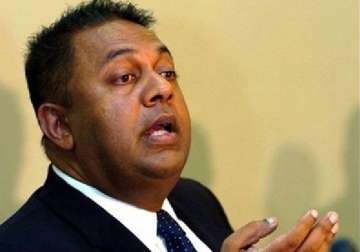Sri Lanka undecided on hybrid court; to launch domestic probe
Colombo: Sri Lanka today said it will go ahead with a domestic mechanism next month to probe war crimes during final phase of the battle against the LTTE but stopped short of backing a hybrid

Colombo: Sri Lanka today said it will go ahead with a domestic mechanism next month to probe war crimes during final phase of the battle against the LTTE but stopped short of backing a hybrid court with international judges proposed by the UN rights body in a damning indictment.
Foreign minister Mangala Samaraweera said no decision has so far been taken on constituting the hybrid court, a day after the UN Human Rights Commission report recommended involving international experts in probing the horrific war crimes committed by both the Sri Lankan army and the LTTE.
He added that a final word on the composition of the court would be taken after consulting all stakeholders. "No decision yet, the final decision will be made through a consultative process of all stakeholders," he told reporters here.
In a blow to Sri Lanka's insistence on a purely domestic probe, a report by UN Human Rights High Commissioner Zeid Ra'ad Al Hussein yesterday favoured creation of a hybrid court including international judges to probe alleged war crimes by Lankan troops during the nearly three decades-long battle especially in the final phase to eliminate the LTTE in 2009.
Samaraweera, however, did sound as if the government would not buy into the recommendation and stick to the idea of a local mechanism.
"Any international role in Sri Lanka's proposed domestic mechanism to probe war crime allegations will be limited to technical advisory support," he said.
Samaraweera added that the government would establish its own "credible, domestic mechanism" and "the domestic inquiry will get underway next January with a time limit of 18 months.
"The consultation process on the domestic mechanism will begin next month and end by January," he said.
Also Read: Sri Lanka to release 16 Indian fishermen ahead of PM's visit
He described the report as a "well-crafted and sober report" written with best of intentions. "It is now up to us to investigate and ensure justice is rolled out."
"Whoever is responsible, if proved, we will punish them without considering their rank or position. By doing that we can protect the good name of the army," he added.
The minister's response came after the release of the UN Human Rights Commissions investigation report in Sri Lanka which said: "The High Commissioner remains convinced that for accountability to be achieved in Sri Lanka, it will require more than a domestic mechanism."
Sri Lanka's main Tamil party Tamil National Alliance (TNA) in a statement echoed the thoughts of the Tamil minority vis-a-vis the report.
It also appealed to the government to accept the report as it welcomed the report of the investigation conducted by the Office of the High Commissioner for Human Rights (OISL) and its recommendations.
"The most important recommendation of the report calls on Sri Lanka to establish a special hybrid court to try perpetrators of international crimes during a nine-year period with the participation of international judges, prosecutors and investigators; and incorporating into domestic law war crimes and crimes against humanity so that these prosecutions can take place.
"The TNA has consistently called for these steps to be taken and welcomes the inclusion of these critical recommendations in the OISL report.
"We further welcome the entire gamut of recommendations of the OISL report, including those that relate to broader Transitional Justice and human rights concerns," it said.
It said there had been "unspeakable crimes committed in our name" but said the party was keen to support reconciliation.
The report deferred by six months was on the UNHRC conducted international investigation into alleged war crimes blamed on both the government and the LTTE.